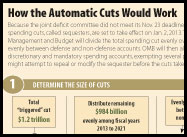CQ TODAY ONLINE NEWS
Nov. 27, 2011 – 8:14 a.m.
Deficit Hawks Take Defensive Stance
By Paul M. Krawzak, CQ Staff
As the dust settles after a joint panel’s failure to recommend at least $1.2 trillion in deficit reduction, congressional leaders and many lawmakers say they remain determined to gain control over the expanding federal debt.
Yet making progress toward that goal is likely to be even harder in an election year than it was in 2011. And for the growing crowd of deficit opponents in Washington, the joint committee’s capitulation was a further indication that their “go big” goal of $4 trillion or more in deficit reduction remains far out of reach.
They were thwarted once in the summer when President Obama and House Speaker

|
||
|
Instead, the panel decided to let automatic cuts of $1.2 trillion take effect in January 2013.
“I think the chances of any big legislation happening in 2012 are pretty remote,” said Robert Bixby, executive director of the Concord Coalition, a deficit reduction advocacy group. “I think everybody has pretty much burrowed into their campaign modes.”
That leaves the anti-deficit lobby in a holding pattern, trying to prevent backtracking by Congress on the automatic cuts, called sequesters, and on other tax and spending policies.
Former U.S. Comptroller General David M. Walker, a leading spokesman for the fiscal responsibility lobby, is not just skeptical that Congress can achieve deficit reduction in an election year. Walker is worried lawmakers are heading in the wrong direction as they push for policies that would increase the deficit, if not accompanied by offsets.
Among those policies are an expansion of a temporary Social Security payroll tax cut and renewal of jobless benefits for long-term unemployed workers, both of which expire at the end of the year. Obama said Nov. 22 he would accept a payroll tax cut that adds to the deficit.
Beyond those relatively small programs is the much larger cost of renewing the tax cuts enacted under President George W. Bush and that expire at the end of next year.
“I see them trying to do things that would make the deficit worse, absent the threat of a presidential veto and absent the wrath of the American public,” said Walker, founder and chief executive of the Comeback America Initiative, a fiscal responsibility advocacy group financed by the Peter G. Peterson Foundation.
Remaining Upbeat
Some fiscal hawks are more optimistic. Maya MacGuineas, president of the Committee for a Responsible Federal Budget, said she sees reason to hope that in spite of election year politics, Congress might pass a major deficit reduction bill next year.
Deficit Hawks Take Defensive Stance
“There’s so many members in both parties who want to do something,” she said. “They will probably let their leaders know that they would like to be led in a direction of reforms instead of delay.”
The failure of the joint committee is not an inhibiting factor, MacGuineas said. “If the supercommittee couldn’t do it, I think there are a lot of other people who would like to give it a shot.”
While the dozen members of the joint committee were in general agreement that the growth of the $15 trillion debt has to be arrested, Republicans and Democrats on the panel were unable to bridge their differences over the role of revenue and changes in entitlement programs in deficit reduction.
In testimony before the joint committee in September, Congressional Budget Office Director Douglas W. Elmendorf warned that under a “current policy” projection that assumes current tax and spending policies are maintained, the amount of federal borrowing required over the long-term “clearly would be unsustainable.”
Bixby said the odds are better that lawmakers would use the next year to start to lay the groundwork for a serious deficit reduction effort in 2013.
He said he would not be surprised if the Senate’s Gang of Six makes another run at trying to get traction for its proposal to reduce the deficit by $4 trillion through a combination of spending cuts, a tax overhaul and changes in entitlement programs.
“I think that would certainly be worthwhile,” Bixby said, adding that the bipartisan Senate group might pick up support from some members of the joint committee.
Meanwhile, efforts are under way to blunt the impact of the automatic cuts, especially the portion that affects defense. But many lawmakers and observers indicated that while attempts may be made to adjust the defense cuts, it will be difficult to undo or even scale back the sequester.
Obama has threatened to veto any attempt to repeal the sequester unless such a change is accompanied by a balanced deficit reduction plan. Asked Tuesday if there is wiggle room in the president’s threat, White House spokesman Jay Carney responded: “No wiggle room. No wiggle room.”